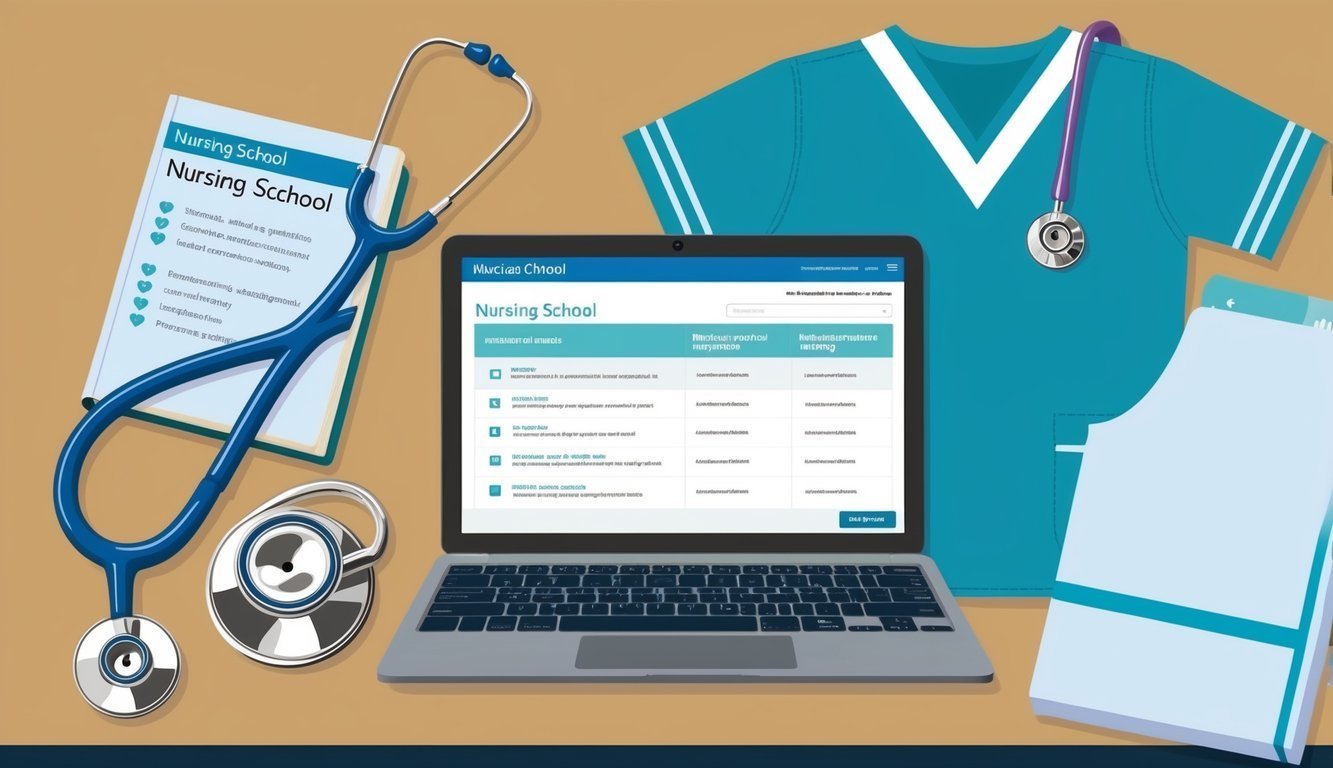Embarking on a nursing career can be an incredibly rewarding journey, but it requires dedication and preparation.
To qualify for nursing school, you generally need to complete specific prerequisites.
These include foundational courses like Anatomy, Physiology, and Microbiology, alongside maintaining a minimum GPA.
These courses are critical for building the knowledge necessary to excel in nursing education and ultimately as a registered nurse.
As you navigate your options, it’s important to understand the differences between Associate Degree in Nursing (ADN) and Bachelor of Science in Nursing (BSN) programs.
Each has its own set of admission requirements, including GPA benchmarks of 2.75 for ADN and 3.0 or higher for BSN programs.
These distinctions can significantly influence your pathway into the nursing profession.
Understanding the prerequisites not only sets you up for success in nursing school but also prepares you for the demands of a nursing career.
By ensuring you meet these educational requirements, you position yourself as a competitive candidate ready to tackle the challenges of healthcare.
For further guidance on this process, explore helpful resources like Nurse.org and NursingProcess.org.
Educational Pathways in Nursing
Choosing the right educational pathway is crucial for your nursing career.
The options available include traditional degrees, accelerated programs, and opportunities for advanced study.
Each pathway has distinct requirements and outcomes that can shape your future in nursing.
Associate Degree in Nursing (ADN)
The Associate Degree in Nursing (ADN) is typically a two-year program offered at community colleges.
This degree prepares you to become a Registered Nurse (RN) by providing foundational knowledge and clinical skills.
Key Features:
- Program Length: 2 years
- Curriculum: Courses in anatomy, physiology, and nursing theory.
- Licensure Exam: After graduation, you must pass the NCLEX-RN exam to obtain your nursing license.
ADN programs often offer flexible scheduling, including online options.
They serve as a clear entry point into the nursing profession, allowing you to start working as an RN quickly.
Bachelor of Science in Nursing (BSN)
The Bachelor of Science in Nursing (BSN) is a four-year degree that provides a more comprehensive education compared to the ADN.
Key Features:
- Program Length: 4 years
- Curriculum: Involves advanced coursework in leadership, research, and public health.
- Career Opportunities: A BSN is increasingly preferred by employers and can lead to higher salaries.
Many universities offer RN-to-BSN programs for current nurses wishing to advance their education.
These can be completed online or in an accelerated format, allowing you to balance work and studies effectively.
Advanced Nursing Degrees
For those seeking to advance their careers further, options exist such as Master of Science in Nursing (MSN) and Doctor of Nursing Practice (DNP).
Key Features:
- MSN Programs: Focus on specialized practice areas, such as Nurse Practitioner (NP) or Nurse Educator.
- DNP Programs: Concentrate on clinical practice, leadership, and healthcare systems.
Advanced degrees often require a BSN as a prerequisite and may provide further opportunities for leadership and higher salaries in specialized fields.
Programs can vary widely in length and format, including many online options for flexibility.
Core Prerequisites for Nursing Programs
To prepare for nursing programs, you must complete core prerequisites that ensure a strong foundation in both sciences and humanities.
These courses are essential for developing the necessary skills for patient care and understanding complex health concepts.
Science and Math Requirements
In nursing, a solid grasp of the sciences is crucial.
The following courses are typically required:
| Course | Description |
|---|---|
| Biology | Fundamental concepts of living organisms and systems. |
| Chemistry | Basic principles of chemistry relevant to healthcare. |
| Anatomy and Physiology | Study of body structures and functions. |
| Microbiology | Understanding microorganisms and their impact on health. |
| Statistics | Essential for interpreting research and data in nursing. |
These courses not only provide foundational knowledge but also prepare you for advanced topics.
Often, specific grades are required, typically around a C or better.
Humanities and Social Sciences
Courses in humanities and social sciences enrich your understanding of human behavior.
| Course | Description |
|---|---|
| English Composition | Develops writing and communication skills necessary in nursing. |
| Introduction to Psychology | Insight into mental processes, crucial for patient interactions. |
| Lifespan Growth and Development | Explores physical, emotional, and social development across ages. |
| Nutrition | Importance of diet in health and recovery. |
These subjects enhance your ability to provide holistic care by understanding your patients’ backgrounds and experiences.
Completion of these courses is essential for a well-rounded nursing education.
For detailed prerequisites, visit Nurse.org.
Skills and Competencies for Nursing Students

To excel in nursing, you must develop a range of both clinical and academic skills.
These competencies are crucial for effective patient care and success in a healthcare setting.
Clinical and Patient Care Skills
Clinical skills are vital for nursing students as they form the foundation for providing quality patient care.
You will need to master essential skills including:
- Patient assessment: Ability to evaluate physical and mental health.
- Basic life support (BLS): Proficiency in CPR and emergency care.
- Medication administration: Understanding dosages and routes.
- Communication: Effectively conveying information to patients and healthcare team.
Familiarizing yourself with medical terminology is also imperative.
This knowledge helps in accurately documenting patient information and collaborating with peers.
Engaging in clinical rotations will enhance your practical skills and prepare you for various healthcare settings.
Academic and Technical Skills
Academic skills lay the groundwork for your nursing education.
You should focus on:
- Critical thinking: Analyzing complex information to make informed decisions.
- Evidence-based practice: Applying research findings to guide patient care.
You must also be proficient in technical skills like using healthcare technologies.
Familiarity with electronic health records (EHR) systems is increasingly important.
Engaging with coursework in anatomy, pharmacology, and nutrition will build your academic foundation.
This knowledge will integrate well with your clinical experiences and prepare you for real-world nursing challenges.
Licensure and Certification
To practice nursing, you must acquire the appropriate licensure and certifications that establish your qualifications.
These credentials vary based on your nursing role, such as Registered Nurse (RN), Licensed Practical Nurse (LPN), or Nurse Practitioner (NP).
Understanding the requirements is crucial for your career path.
NCLEX-RN Examination
The NCLEX-RN examination is mandated for obtaining your RN license.
This standardized test evaluates your competence in nursing practices and patient care.
You must successfully complete an accredited nursing program before you can take the exam.
Key points include:
- Eligibility: Complete a state-approved nursing program.
- Content: The exam covers four major areas: Safe and Effective Care Environment, Health Promotion and Maintenance, Psychosocial Integrity, and Physiological Integrity.
Once you pass the NCLEX-RN, you can apply for licensure through your state’s board of nursing, which oversees the licensing process.
For further guidance, you can refer to the NCSBN.
Specialty Certifications
Specialty certifications can enhance your career and demonstrate your expertise in a specific area of nursing.
Organizations like the American Nurses Credentialing Center (ANCC) offer certifications in various specialties, including pediatrics, geriatrics, and critical care.
Key points to consider include:
- Eligibility Requirements: You may need a certain amount of clinical experience or additional coursework in your specialty area.
- Benefits of Certification: It can improve job prospects, lead to higher salaries, and increase job satisfaction.
In addition to RNs, Certified Nursing Assistants (CNAs) and LPNs may pursue relevant certifications that align with their roles.
These credentials contribute to your growth and establish your proficiency within your nursing scope of practice.
Preparing for Nursing School Application
Navigating the application process for nursing school involves understanding the essential tests and requirements, as well as the significance of letters of recommendation and personal statements. These elements are critical for presenting a strong application.
Admission Tests and Requirements
You will need to complete specific admission tests as part of your nursing school prerequisites.
Many programs require the Test of Essential Academic Skills (TEAS), which assesses your reading, math, science, and English language skills.
Here’s a table outlining typical testing requirements:
| Test | Purpose |
|---|---|
| TEAS | Evaluates readiness for nursing school |
| HESI A2 | Similar assessment focused on nursing fundamentals |
Additionally, most nursing programs have specific GPA requirements.
For an Associate Degree in Nursing (ADN), a minimum of 2.5 to 2.75 GPA may be needed, while Bachelor of Science in Nursing (BSN) programs often demand at least a 3.0 GPA.
It’s important to check with your desired nursing schools for their exact requirements.
Letters of Recommendation and Personal Statements
Letters of recommendation are crucial to your nursing school application.
You should obtain them from individuals who can attest to your professional abilities, work ethic, and commitment to healthcare.
Ideal recommenders include previous instructors or supervisors in healthcare settings.
Personal statements allow you to express your motivations for pursuing a nursing degree.
This is your opportunity to explain your career goals and experiences that have prepared you for nursing.
Tailor your statement to match the values and mission of the nursing programs you are applying to.
Here’s a checklist for your recommendation letters and personal statement:
- Recommendation Letters: Choose 2-3 strong recommenders.
- Personal Statement: Focus on your passion for nursing, relevant experiences, and career aspirations.
Taking these steps seriously can enhance your application and readiness for a nursing career.

